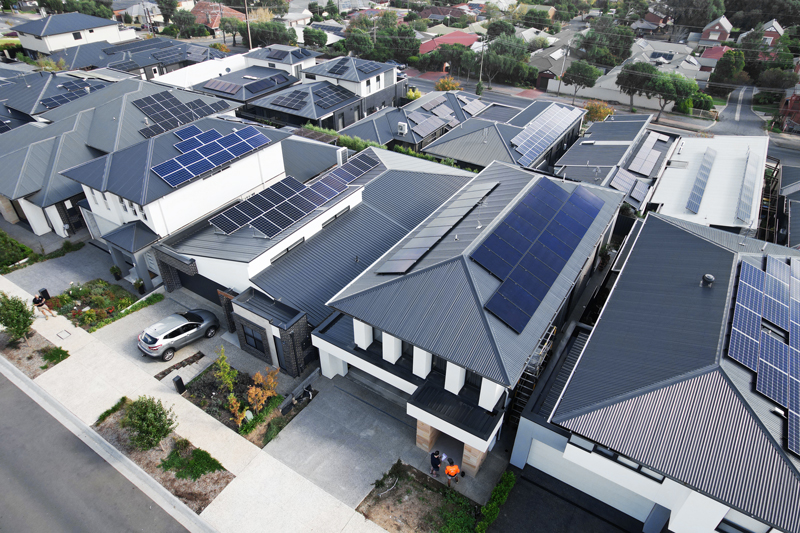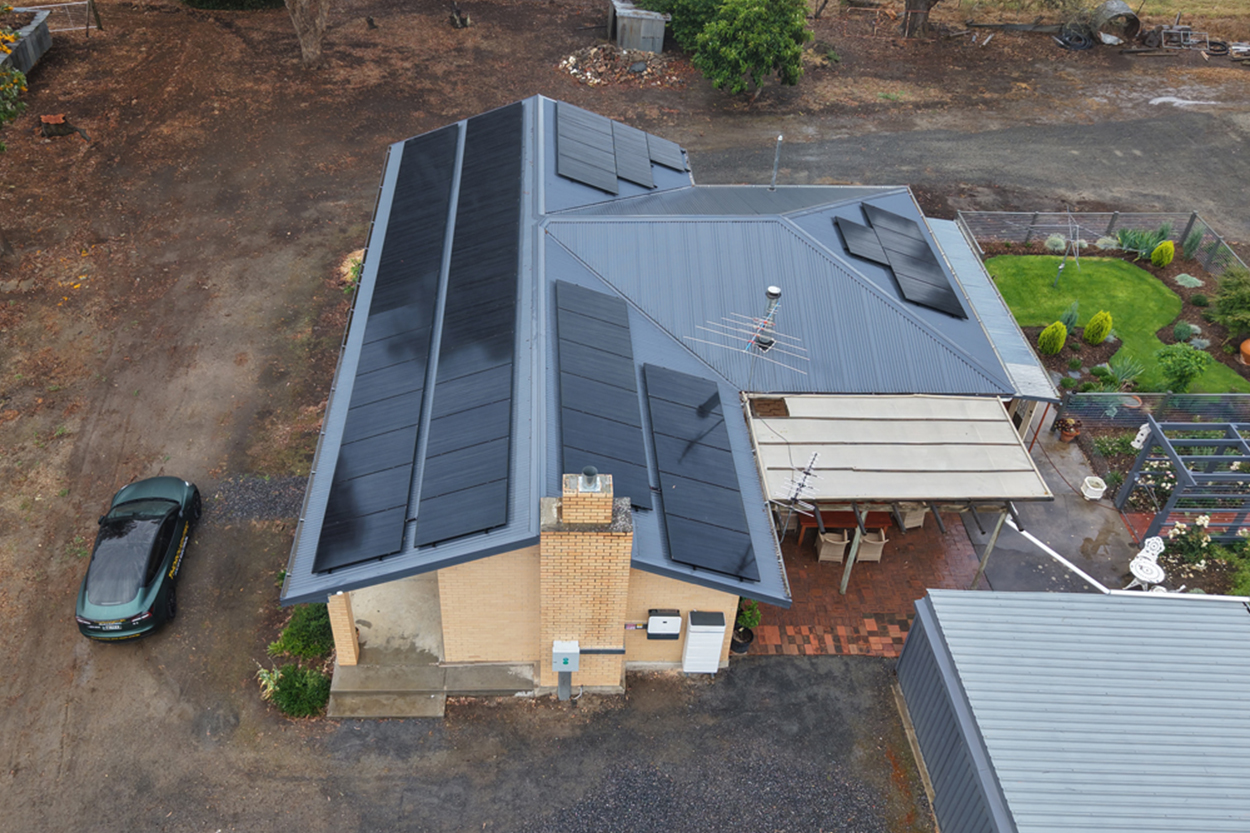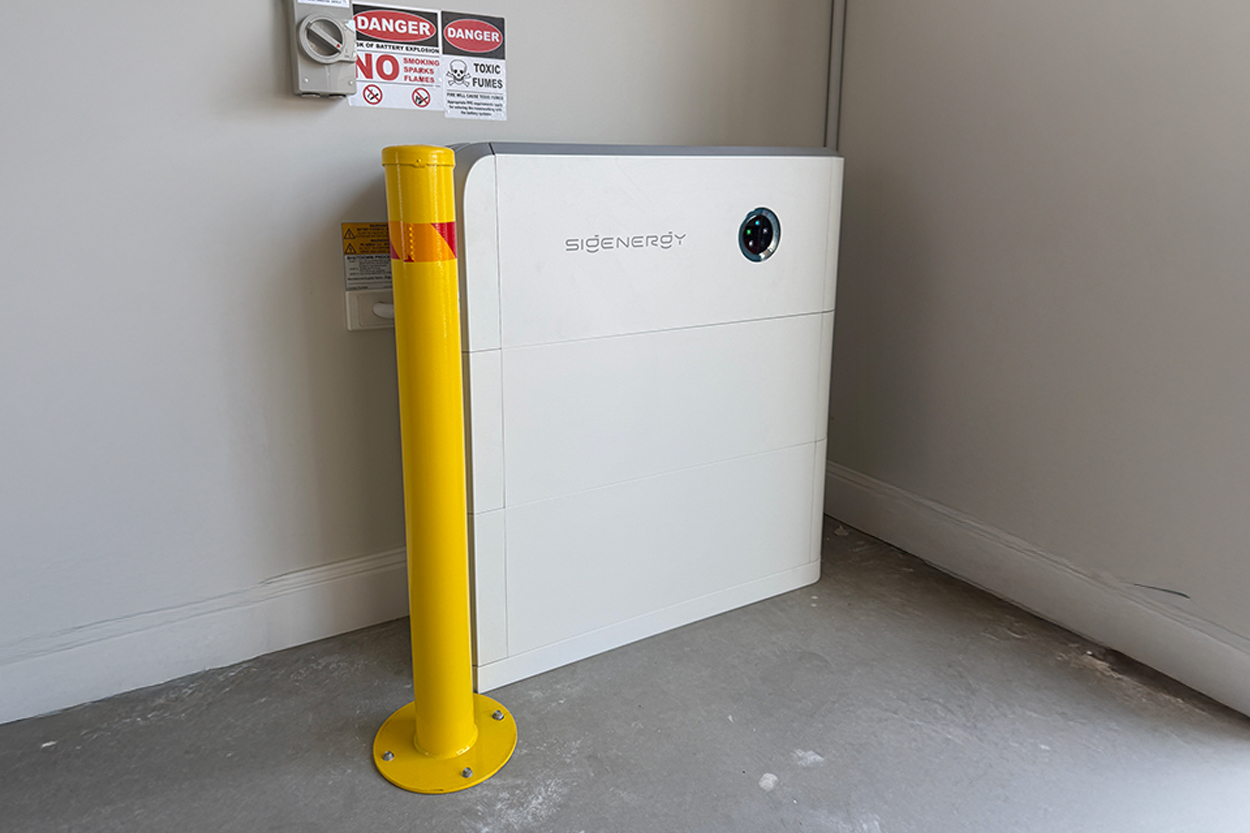
Solar panels consist of photovoltaic, or PV, cells, that absorb sunlight and converts it into direct current (DC) electricity. This is fed into your inverter, which converts the DC electricity into alternating current (AC) electricity, making it suitable for use in your home or business.
Choosing the best solar panel all depends on your needs, budget, location, and conditions that your solar system will operate in. However, we have a range of well-known solar panel brands that we recommend, including Aiko, Jinko Solar, and REC, that we trust to support your solar needs.
We love solar panels for their ability to help properties generate their own clean, green, and sustainable energy. Installing solar panels on your property empowers you to reduce your electricity bill, reduce your reliance on grid power and traditional energy sources, reduce your carbon footprint, and, ultimately, gain your energy independence.
The financial investment you make depends on the size of your solar system, the quality of your panels and components, and the complexity of your installation. As a guide, a 6.64kw system starts from around $6,500 and a 10.375kw system starts from around $10,000.
Our on-site energy assessment ensures we tailor your solar system to suit your budget and electricity generation goals.
kWh stands for ‘kilowatt hour’, which is a measurement of electricity used per hour.
In simple terms, a kilowatt is a thousand watts. A kilowatt rating on an appliance will tell you how much power that appliance uses at any one time, whereas kWh tells you how much power you’ve used in total.
Your property’s power consumption is measured and billed in kWh. You solar system is rated in the amount of kilowatts it can produce, which we can then extrapolate to determine the amount of electricity it will generate in kWh.
There are a number of factors we need to consider when calculating the system size necessary to cover the electricity bill for your home or business. These include your average annual kWh usage, orientation and pitch of your roof, potential shading, how and when you use electricity, and your eligibility for feed-in tariffs from your electricity supplier.
However, there’s one source you can check that will give you a good idea of your electricity usage: your electricity bill. Check your electricity bills across the last year, and this should give you an idea of how much electricity you’re likely to use. We can then help you identify the right size solar system for your needs—with space to grow in the future.
Keep in mind, even if you can’t afford a system to cover your entire electricity bill, even a smaller system which offsets your usage is beneficial and cost effective in the long run.
Some states offer feed-in tariffs. These tariffs are what your electricity supplier will pay you for the electricity your system generates that’s fed back into the grid.
Solar systems only produce electricity when they’re exposed to sunlight. So at times when there’s no sunlight, such as when it’s particularly cloudy, or overnight, they don’t product electricity. In these cases you’ll need to draw electricity from another source—like your local electricity grid—to continue powering your property.
A solar battery gives you a way to store any unused electricity you generate and use it when your system isn’t generating power.
Your solar system’s output depends on the size of your system, sunlight availability, and your property’s energy consumption. With the right-sized system, your solar panels can power your entire home—but it’s typical to still be connected to the power grid and draw electricity when you need it.
For reference, the average daily usage for a four-person household is around 20kWh.
Solar panels work best in full sun. They can still generate electricity when it’s cloudy, but they may work less efficiently. If it’s a cold day but with full sun, you should be fine.
During a power outage your solar system will automatically shut down and disconnect itself from the grid as a safety measure. Once grid power is restored the system will then automatically turn back on.
If you have a solar battery installed it will automatically begin supplying power to your property during a grid outage. Just make sure that your backup mode is configured correctly in your system setting.
The size of your solar system will determine its final price. However, if you’re able to switch the majority of your electricity use to the solar electricity that your system generates, a good estimate is that it can take between four to seven years to pay off your solar system.
Yes, but it will be significantly lower. If your property generates more energy than you use, you may receive a credit for the excess power that’s sent back to the grid through a feed-in tariff.
Once you approve the quote and we organise an installation date, solar panel installation typically takes between one and three days, depending on the size of your system.
In Australia the sun passes from east to west at a slightly northern angle, so facing your solar panels to the north at the correct angle of elevation will provide the best performance (most kWh per dollar). There are some instances where solar panels can be installed facing east or west, as long as proper considerations are made—if this is the case for your property, we’ll discuss this all with you in your initial consultation.
Solar power is an investment, and we want you to continue using your solar system long into the future. Solar panels typically have a lifespan of 25-30 years, with warranties that cover their performance and durability. Solar batteries usually last between five and 15 years, depending on usage and the number of charge cycles.
Our solar panels come with a product and performance warranty of up to 30 years. We also offer a 10-year workmanship warranty on the installation itself. Our inverter warranties range from 5 to 10 years.
Absolutely. It’s not something you have to do right away. Adding a battery is a reasonably straightforward, too. All we do is install the solar battery near your inverter and then connect the two.
If you have the space available, you can expand your solar system by adding more panels. We’ll simply install and connect them like we have for your existing panels. However, you’ll need the right inverter to make this happen. If you’re thinking about installing more panels, we can discuss options to ensure your inverter and electrical setup can support the additional capacity.
This is one of the nerdiest benefits of your solar system: your solar system will generally come with a monitoring app that allows you to track energy production, usage, and any issues with your system in real time. We’ll help you get this set up so you can see exactly how your system is working.
First, check your monitoring app for alerts or error messages. Then take a look around your property to see if your solar panels are being shaded by trees or covered in debris. If any problems persist, get in touch with us and we can take a look to see what’s going on.
Changing your WiFi password can disrupt the connection between your solar system and its monitoring app, preventing you from viewing real-time data on energy production and usage. To fix the issue, log into your solar monitoring app, head to the Settings or Network Configuration section and update the credentials.
The solar inverter is the unit that converts the direct current (DC) electricity generated by your solar panels into alternating current (AC) electricity, which is what your property uses.
There are a few different types of inverters available. String inverters are connected to multiple solar panels in an array. Hybrid inverters convert DC power from both solar panels and batteries. And microinverters are small inverter units that attach to a single solar panel. We’ll help you choose the right one for your system.
Most quality solar inverters last between 10 to 15 years, though some premium models may last longer. Many come with warranties ranging from five to 10 years or more.
When your inverter isn’t working properly, you might notice a drop in system performance, or higher than usual electricity bills. Obvious signs are error messages on the display, no lights, or no screen activity. If you think your inverter isn’t working properly, get in touch with us and we’ll come and take a look.
You can, but it all depends on your current solar system. If you plan to add a battery in the future we recommend installing a hybrid inverter initially. We can help you determine if your solar system setup can be adapted at a later date.
Solar panels have to be installed at precise and angles to maximise the amount of sunlight they get. As such, they need to be carefully secure to your roof (or another location). Solar panel mounting equipment is the hardware that attaches your solar panels where they need to go. Full mounting equipment rails, brackets, clamps, and fasteners designed to hold panels safely in place.
Unfortunately not. Solar panel mounting systems vary in quality, materials, and design. At TTEC we only supply brands that we trust to do the job; brands that we know create high-quality mounting gear that ensures long-term durability, weather resistance, and optimal panel performance.
When installed correctly your solar panel mounting equipment is designed to actually protect your roof, and can also prevent leaks. It includes flashing and seals to maintain the integrity of your roof.
Most solar panel mounting systems can adapt to a range of roof types, including tin, tile, and flat roofs. But to make sure, we’ll come and take a look first. We can then advise on the right mounting solution that will suit your specific roof materials and structure.
Your solar battery connects to your inverter and stores any excess energy that your solar system generates during the day, feeding it back into your system later when your panels aren’t producing electricity. This could be during a cloudy day, during a blackout, or overnight. A battery gives you more control over your energy use.
Not at all. The template is built using Webflow’s visual Designer, making it easy to change layouts, colors, and fonts—even if you’ve never coded before. Advanced tweaking is still possible if you’re comfortable with HTML/CSS.
This depends on the size of your battery and your property’s energy needs. Depending on the usage, many batteries are capable of powering essential appliances like lights, the fridge, and Wi-Fi for several hours, or even throughout the night. We can advise on the right sized battery for your system, to help you get the most our of your solar electricity.
Absolutely. It’s not something you have to do right away, and depending on your property’s needs, you may not even need one. Adding a battery is a reasonably straightforward, too. All we do is install the solar battery near your inverter and then connect the two.
A good, high-quality solar battery will last between 10 and 15 years, depending on your usage. Most battery companies provide a 10-year warranty, or a set number of charge cycles.
That’s the aim, yes. Installing a solar battery allows you to store the electricity you generate then use that stored electricity later, rather than drawing from the grid—particularly during peak times. This allows you to reduce your electricity bills, and ensure a more stable supply of power.
We recommend that you monitor your battery’s charge/discharge cycles using the system’s app. This way you can make sure it’s working the way it should. Avoid fully discharging it too often to preserve its health, and ensure it stays in a well-ventilated and dry location.
Standard power points aren’t set up for the type of charging require by an EV, so it would be incredibly slow—it can take up to 40 hours to fully charge your EV through a regular power point. By comparison, a dedicated EV charger is designed to deliver faster, safer, and more efficient charging. They offer smart features like scheduling and energy monitoring, so you get more control over how you charge your vehicle.
While this typically depends on the type of EV charger you have, and your vehicle, most home chargers can fully charge an EV overnight. With a Level 2 charger this usually takes between 6 and 10 hours.
Absolutely—installing an EV charger allows you to take even more advantage of your solar system. An EV charger can be connected to your solar system, allowing you to use excess solar energy to charge your vehicles. By using your own generated energy, you can save even more on your electricity bill, while reducing your carbon footprint.
Yes, an EV charger must be installed by a licensed electrician. This ensures it’s installed safely, securely, complies with all local regulations, and works properly. At TTEC, our electricians can help you get the right EV charger for your property. Get in touch with us for a quote.
The majority of EV chargers use a universal Type 2 plug, which is compatible with most modern electric vehicles. However, be sure to check your EV’s specifications first. And if in doubt, get in touch with us. We can advise on the right EV charger for your property and your vehicle.
Heat pumps work like a reverse air conditioner. They draw in warm air from outside the unit, where the warmth from the air heats a refrigerant liquid, turning it into a gas. This gas then goes through a compressor, creating heat that warms the water inside the internal tank. This process happens again and again and again until the water in the tank reaches the desired temperature.
Yes, heat pumps are very energy-efficient. The method they use to heat water uses up to 70% less energy than traditional electric or gas hot water heaters. This makes them a fantastic option for lowering your energy bill.
The beauty of modern heat pumps is that they’re designed to work in a wide range of temperatures and weather conditions. They may have to work harder in colder temperatures, meaning they may not be as efficient during this time—while still being much more efficient and energy-smart than a typical hot water heater.
Much like a traditional hot water heater, heat pumps require minimal maintenance. You can do basic maintenance yourself, like checking that the air intake stays clear. But for a more comprehensive review, we recommend getting a professional to check your heat pump’s performance every one or two years, to make sure it continues to work efficiently.
Absolutely. Heat pumps run off your home electrical system, so if you have solar panels, your heat pump will use this electricity as its power supply. Better yet, they can be programmed to run during the best solar generation times, meaning you use free energy from the sun to heat your water, further reducing your energy costs.
While you shouldn’t get up on your roof and clean them every day, we do recommend regular maintenance to ensure their optimal performance and longevity. And it makes sense: if your panels get dusty, dirty, have debris land on them, or receive any cracks, they won’t work as efficiently. The good news is that we take care of this for you. We recommend getting your solar panels cleaned and inspected annually, so you can make sure any potential issues are identified before they turn into problems.
The signs aren’t immediately obvious, but you may start to notice a drop in system performance or energy production, or higher than usual electricity bills. You might start to see error messages on your inverter, no lights, or no screen activity. If you’re on the roof, visible damage to your solar panels is a clear sign they need repairs. However, you don’t need to do this yourself. Get in touch with our team and we’ll take care of it for you.
It depends on what’s wrong. Minor issues such as loose wiring or faulty connections can generally be repaired. A damaged panel may need to be replaced entirely, depending on the extent of the damage.
Absolutely. Dirt, leaves, bird poo, and other debris works to block sunlight from reaching your solar cells, reducing their electrical output. A gentle clean with water once a year or so works wonders to make sure nothing is blocking their sun.
Solar systems are long-term investments, and most solar system providers offer performance and product warranties. While these include the usual issues like manufacturer faults, external problems or issues may not be included. Always be sure to check the terms of your warranty first.











